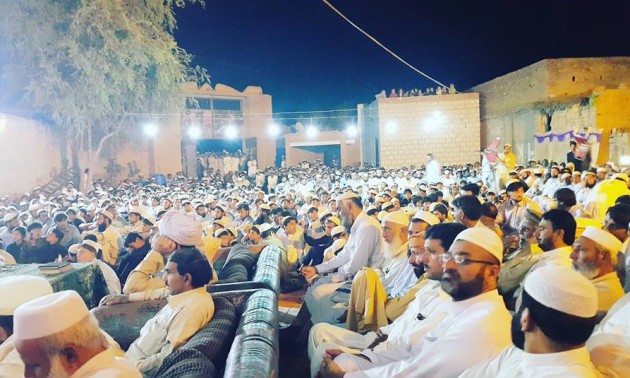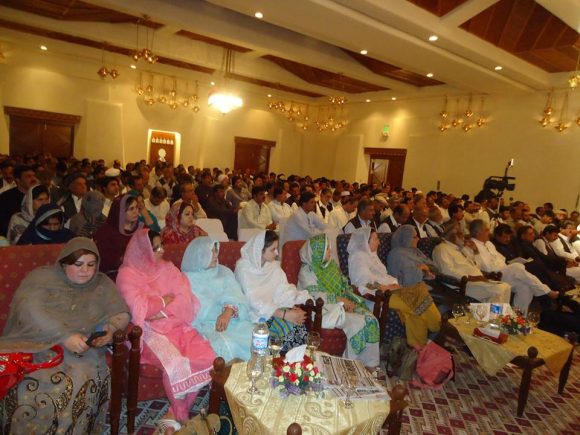Peace Poetry: A Burgeoning Movement in Pakistan’s KP Province
POETRY FORMAT, 4 Sep 2017
More than 300 books have been written by Pakistani poets on the subject of “peace” over the last decade and poetry gatherings are drawing large crowds.
Pakistan’s war-ravaged Khyber Pakhtunkhwa province has witnessed some of the country’s bloodiest conflicts of the past decade. Most ordinary people, tired of volatility, terrorism and the US-led “war” on it, simply long for peace.
Voicing the desire of citizens, poets in the province have written extensively about this longing. According to Inamullah, the owner of University Book Agency, a leading bookshop in Peshawar, more than 300 books have been written by Pakistani poets on the subject of “peace” over the last decade.
“We sell almost 1,000 ‘peace poetry’ books in a month and sales of regular and poetry books are equal,” Inamullah says.
For many ‘peace poets,’ the written word is a way of expressing the pain of victims and raising consciousness.
“Terrorism is the invention of destructive minds and peace can only be achieved by understanding and changing destructive minds into peaceful minds through peace education,” says Professor Abaseen Yousafzai, a renowned Pashto poet and Director of the Pashto Department at Islamia College Peshawar. “Poets strive in a war environment to protect people from unrest by struggling for peace.”
Peace poetry gatherings are an important tool for reaching people and spreading awareness in areas riven by conflict. They are a way to bring people with different backgrounds and ideologies together in the name of peace.
“Peace poetry is a great uniter, bringing divided people together and directly leading them to peace,” Yousufzai says. “It is a powerful weapon against war. We need tranquility… for the sake of human survival.”
Following years of suffering, levels of violence have dropped over the last year or so but peace has not been restored completely in KP. Yousaufzai says the main reasons are that people put their own perceived interests before any legal or moral framework. “The real enemies of humans are those tcreating war, preparing people for war and making arms.” he says.
Peace poetry, says Israr Attal, a poet and author based in Peshawar, not only resonates with people on a deeply human level but also helps to create an environment where peacebuilding can take place. “It can mentally prepare people to confront terrorism,” he says. “War and destruction have been reduced in Khyber Pakhtunkhwa partly due to the desire of the people for peace.”
“Terrorism is the invention of destructive minds and peace can only be achieved by understanding and changing them into peaceful minds through peace education”
Gatherings are important, he says, partly because there is little space given on mainstream media channels to promoting the values of peace. Over the last few years, various organizations have taken to staging monthly and even weekly peace poetry events in Khyber Pukhtunkwa’s cities. Such events consistently draw large crowds.
“We have lots of literary organizations fighting for peace… but our voices of peace are scattered in the current warlike circumstances,” he says, adding that there is much work to be done in changing hearts and minds. “If we have unity, then we can defeat this destructive war.”
Terrorists have banned music in areas of the province which they control and say it is prohibited in Islam. Many people are afraid to sing but it is promote at peace poetry events. The singing of peace poetry, Attal clams, can touch people and bring about change in society.
Adnan Bangash, an avid reader of peace poetry, says the promotion of peaceful literature is the best way to guide people in the current chaotic circumstances in which the country finds itself.
“Our land is combusting in the flames of war,” he says. “By spreading peace education, we can support society to turn away from conflict.”
DISCLAIMER: The statements, views and opinions expressed in pieces republished here are solely those of the authors and do not necessarily represent those of TMS. In accordance with title 17 U.S.C. section 107, this material is distributed without profit to those who have expressed a prior interest in receiving the included information for research and educational purposes. TMS has no affiliation whatsoever with the originator of this article nor is TMS endorsed or sponsored by the originator. “GO TO ORIGINAL” links are provided as a convenience to our readers and allow for verification of authenticity. However, as originating pages are often updated by their originating host sites, the versions posted may not match the versions our readers view when clicking the “GO TO ORIGINAL” links. This site contains copyrighted material the use of which has not always been specifically authorized by the copyright owner. We are making such material available in our efforts to advance understanding of environmental, political, human rights, economic, democracy, scientific, and social justice issues, etc. We believe this constitutes a ‘fair use’ of any such copyrighted material as provided for in section 107 of the US Copyright Law. In accordance with Title 17 U.S.C. Section 107, the material on this site is distributed without profit to those who have expressed a prior interest in receiving the included information for research and educational purposes. For more information go to: http://www.law.cornell.edu/uscode/17/107.shtml. If you wish to use copyrighted material from this site for purposes of your own that go beyond ‘fair use’, you must obtain permission from the copyright owner.

